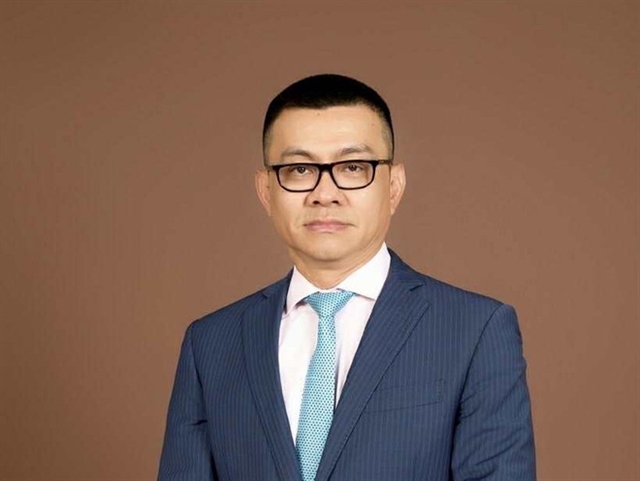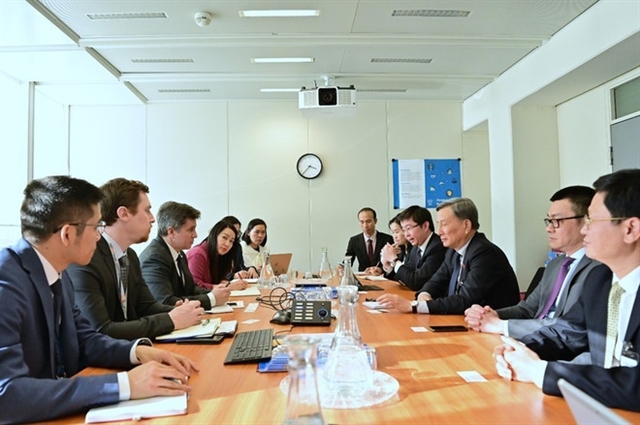 Talking Shop
Talking Shop

 |
| Ambassador Vũ Lê Thái Hoàng, Permanent Representative of Việt Nam to the United Nations and International Organisations in Vienna, Austria. — Photo courtesy of Embassy of Việt Nam in Austria |
With its own capabilities and the close, experienced partnership of the International Atomic Energy Agency (IAEA), Việt Nam is well-positioned to pursue its first nuclear power plant that meets the highest international safety standards. Ambassador Vũ Lê Thái Hoàng, Permanent Representative of Việt Nam to the United Nations and International Organisations in Vienna, Austria, spoke with the Vietnam News Agency on the country’s deepening cooperation with the IAEA in applying nuclear technology for peaceful purposes.
How do you evaluate the cooperation between Việt Nam and the IAEA in applying nuclear technology for peaceful purposes in recent years?
Việt Nam’s cooperation with the IAEA has made positive, substantive and comprehensive progress, particularly in the application of nuclear technology for sustainable development. Việt Nam has regarded the IAEA a strategic partner in improving its capacity in nuclear science and technology, aiming to use nuclear energy for peaceful, safe and effective purposes.
With the signing of the Country Programme Framework for the 2022-2027 period, bilateral cooperation has been clearly defined and closely aligned with Việt Nam’s development priorities, focusing on seven key areas: radiation safety, health, agriculture, environment, energy, industry and workforce development.
More than 20 projects are being effectively implemented with financial and technical support from the IAEA, thereby enhancing Việt Nam’s scientific and technological capacity and strengthening its legal and technical systems. These are important pillars of cooperation, yielding many practical outcomes in recent years.
With the IAEA’s assistance, Việt Nam is building a 10MW research reactor to replace the current Đà Lạt reactor. This marks an important step in preparing for research, training and production of radioactive isotopes for medical and industrial use.
In addition, the IAEA’s first INSServ mission to assess Việt Nam’s national nuclear security in March 2023 contributed to strengthening the country’s institutional capacity and confirming its commitment to global nuclear security standards.
In the health sector, many projects have been implemented to enhance Việt Nam’s capacity for cancer diagnosis and treatment using nuclear medicine. With support from the IAEA, the country’s equipment and expertise in this field have significantly improved, delivering practical benefits to the public.
In agriculture, the IAEA has supported Việt Nam in applying nuclear and radiation technologies in plant breeding, plant quarantine, post-harvest preservation and pest control. The results achieved have contributed to increasing productivity, product quality and efficiency in sustainable agricultural production.
As for workforce development, the IAEA has provided practical and long-term support to Việt Nam. The agency has not only sponsored hundreds of Vietnamese officials to participate in training and specialised programmes, both at home and abroad, but has also closely coordinated with Vietnamese authorities to organise numerous training courses and regional seminars within the country. These activities have made significant contributions to enhancing professional qualifications and gradually building a team of highly skilled nuclear technical experts, capable of meeting the requirements for the safe and sustainable development of the atomic energy sector now and in the future.
A highlight of recent cooperation is the trilateral mechanism between Việt Nam, Laos and Cambodia coordinated by the IAEA. Việt Nam plays a key role in training experts, sharing experiences and providing support to research facilities in the two neighbouring countries.
Since 2022, more than 15 Cambodian and Lao officials have been trained in Việt Nam in such fields as nuclear medicine, non-destructive testing, radiation safety and agricultural applications. This not only confirms Việt Nam’s internal capacity but also demonstrates its active role in enhancing regional cooperation and promoting the values of nuclear technology for peaceful purposes.
I believe that, with the growing need for sustainable development and the national energy transition strategy, including the goal of restarting nuclear power, the cooperation between Việt Nam and the IAEA is set to play an increasingly pivotal role, helping the country effectively apply nuclear technology across practical sectors and ensure the highest standards of safety and security.
Việt Nam and the IAEA have recently held several working exchanges related to the construction of the first nuclear power plant in Việt Nam. What are the key outcomes of these bilateral engagements?
To achieve the energy transition and realise its net-zero emissions commitment by 2050, Việt Nam has been gradually conducting research and preparing necessary conditions to build its first nuclear power plant. In this process, the IAEA has been a key partner, accompanying Việt Nam through various practical activities.
Recent working sessions between Việt Nam and the IAEA include a meeting between Chairman of the National Assembly’s Committee on Science, Technology and Environment Lê Quang Huy and Deputy Minister of Science and Technology Bùi Hoàng Phương with the IAEA’s Department of Nuclear Safety and Security in March; a meeting between Vice Chairwoman of the National Assembly’s Committee on Legal and Judicial Affairs Nguyễn Thị Mai Phương and representatives of the Vietnam Agency for Radiation and Nuclear Safety with IAEA experts in April; and a discussion between Deputy Minister of Foreign Affairs Lê Thị Thu Hằng and IAEA Director General Rafael Grossi on the sidelines of the 34th Session of the Commission on Crime Prevention and Criminal Justice in May.
All of these efforts reflect Việt Nam’s strong political will and proactive approach in working closely with the IAEA to prepare for a phase of safe, sustainable nuclear power development aligned with international standards.
 |
| A meeting between Chairman of the National Assembly's Committee on Science, Technology and Environment Lê Quang Huy and Deputy Minister of Science and Technology Bùi Hoàng Phương with the IAEA's Department of Nuclear Safety and Security in March. — Photo Báo Pháp Luật |
One of the most notable outcomes is a mutual agreement on the need to strengthen cooperation in building a legal framework, providing policy advice, transferring technology, sharing experiences, and training workers. These are key areas of cooperation aimed at helping Việt Nam not only develop its overall capacity to apply nuclear technology, but also lay a solid foundation for the successful implementation of its first nuclear power plant, ensuring the highest standards of nuclear safety and security.
At the same time, the IAEA has expressed its readiness to support the revision, development and finalisation of the amended Law on Atomic Energy, in order to ensure a comprehensive, consistent and internationally compliant legal framework in terms of safety, security and non-proliferation.
Director General Rafael Grossi expressed appreciation for Việt Nam’s efforts and long-term vision in orienting nuclear power development as a strategic solution to its energy challenges. He confirmed that the IAEA views Việt Nam as a priority partner in Southeast Asia and is committed to continuing close cooperation across the three key pillars: technology, legal frameworks, and workforce development.
I believe that these working sessions have contributed to laying an important policy and technical foundation for Việt Nam to progressively realise its goal of developing nuclear energy for peaceful, safe and sustainable purposes.
In the next few years, with the support of the IAEA, close coordination among domestic ministries and sectors, and strong political determination at the highest level, we are fully capable of building a modern nuclear power programme that meets international standards and contributes to ensuring national energy security in the long run.
For Việt Nam, in building nuclear power plants, absolute safety and the development of skilled workers are two primary concerns. How will the IAEA support Việt Nam in addressing these issues?
Ensuring absolute safety and cultivating high-quality workers are indeed the two essential pillars for the success and sustainability of any nuclear power programme. This is especially true for Việt Nam, as we are step by step restarting our nuclear power development programme after a period of suspension.
In the period prior to the suspension of the Ninh Thuận project in 2016, the IAEA provided Việt Nam with practical support across a range of areas. Việt Nam has twice invited Integrated Nuclear Infrastructure Review missions to the country, in 2009 and 2012, to conduct comprehensive assessments of its readiness to develop nuclear power infrastructure, in line with the IAEA’s 'Milestones' framework. On that basis, the IAEA issued dozens of recommendations related to regulatory regime, nuclear safety, workforce training, financing and emergency preparedness. These efforts play a key role in helping Việt Nam establish a comprehensive legal framework, an inter-agency coordination mechanism, and a long-term workforce development strategy for the sector.
Concurrently, within the framework of its technical cooperation programme, the IAEA has sponsored hundreds of Vietnamese experts to participate in training courses, workshops and overseas internships, as well as organising on-site training in areas such as nuclear plant operation, radiation safety, nuclear regulation and emergency response.
At present, as Việt Nam officially resumes its nuclear power programme, our cooperation with the IAEA is being reactivated with a renewed sense of focus and proactivity. In recent discussions between Vietnamese authorities and IAEA Director General Rafael Grossi, the two sides have outlined specific areas of further support.
The IAEA has also expressed its willingness to provide technical assistance in developing a robust legal and regulatory framework by offering feedback on the draft revised Law on Atomic Energy, supporting the establishment of an independent nuclear regulatory body and a licensing process for nuclear power plants, and enhancing routine monitoring and inspection capacities.
As for workforce development, Việt Nam has already built a solid foundation thanks to earlier cooperation programmes. However, putting a nuclear power plant into operation in the future will require a new generation of experts trained to the highest standards.
The IAEA has indicated its willingness to collaborate with the Ministry of Science and Technology, domestic research institutes, universities and any potential third-party donors to design in-depth training programmes like those of earlier collaborations during the 2012-2013 period. They would include 'train-the-trainers' schemes, simulated power plant exercises, and site-based programmes in countries operating similar nuclear facilities.
I firmly believe that, with Việt Nam’s existing capabilities and the IAEA’s experienced support, the country is fully equipped to develop a nuclear power programme that meets the highest international safety standards while gradually building a skilled workforce capable of mastering technology and managing the nuclear energy sector effectively in the years ahead. — VNA/VNS




